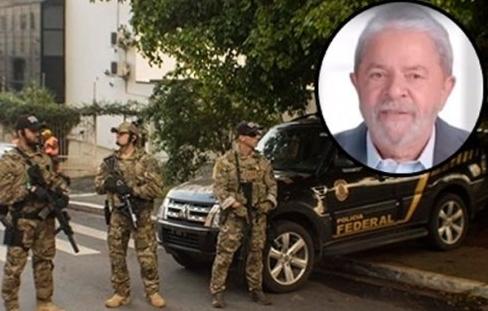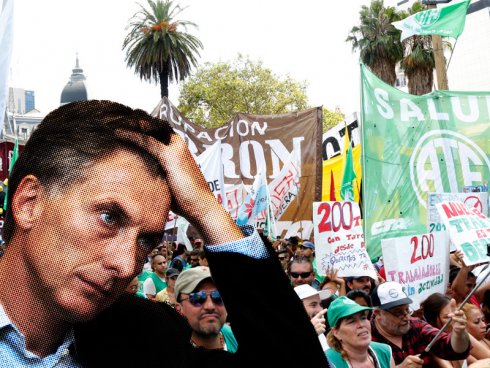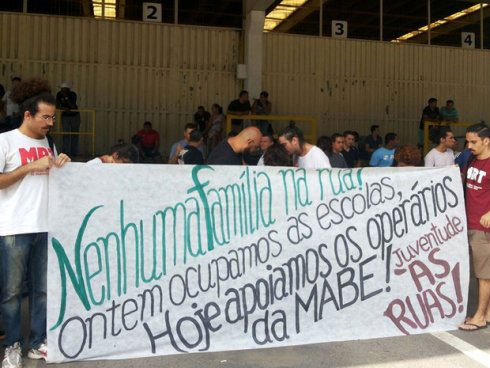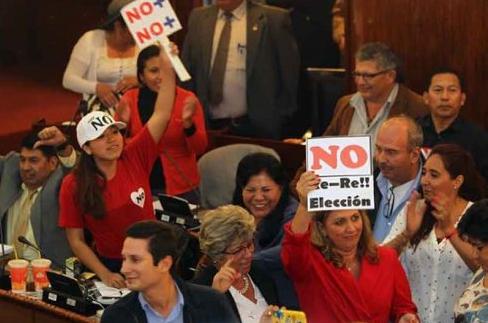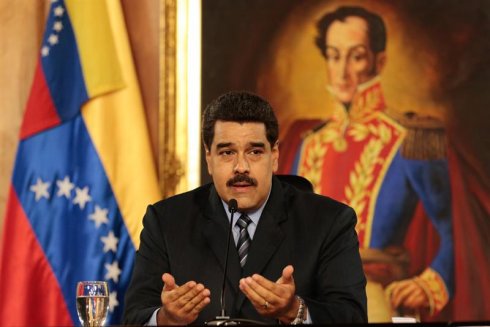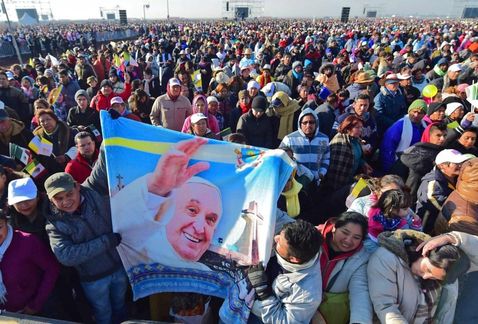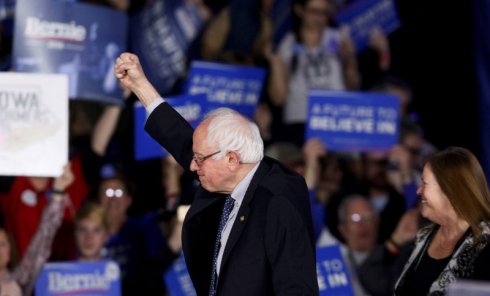Ukraine: Political crisis and disputes between the imperialist powers and Russia
19/04/2014
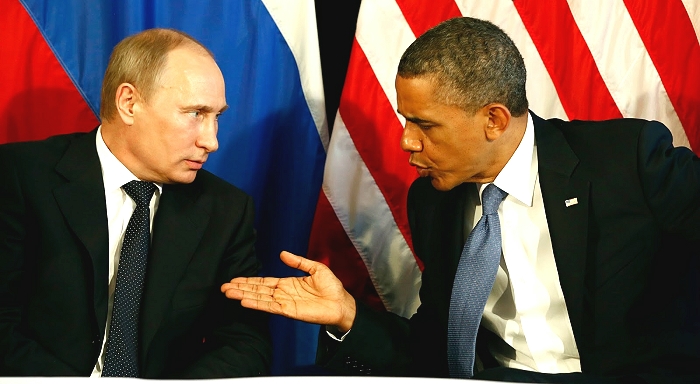
Ukraine: Political crisis and disputes between the imperialist powers and Russia
The mobilizations that have been shaking Ukraine since November and have led to the substitution of Yanukovych by a pro-Western government have opened up a massive crisis which has gone beyond the borders of the country and turned into an international conflict in which US and European imperialism as well as Russia are intervening actively. This conflict, which has led to the highest tensions between Russia and the West since the fall of the Soviet Union, reached its climax with the annexation of the Crimean peninsula by Russia and continues today in the negotiations between the US Secretary of State and his Russian counterpart about the future of Ukraine, in the context of a tense climate as is evidenced by the – as yet small-scale – mobilizations in the East of the country demanding unification with Russia. The direct interference of the West and Moscow does not constitute any kind of progressive outcome for the workers and poor masses of Ukraine.
The character of the Maidan mobilizations
The decision by the pro-Russian Yanukovych government in November 2013 not to sign the association agreement with the European Union (EU) triggered a wave of mobilizations in several cities in Western Ukraine, above all on Maidan square in the capital Kiev.
The Yanukovych government tried through different measures to stop the demonstrations and gave the green light for violent repression that in the end led to its downfall. After several days of violent confrontations which led to almost 100 deaths, and after a failed attempt at a negotiated solution with the EU, the Ukrainian parliament deposed Yanukovych on 23 February and put Alexandr Tuchinov (from the most important party of the liberal opposition) in his place as interim president, calling for early elections on 25 May.
Even though the demonstrations took place against a background of extreme hardship caused by the deepening of the economic crisis and hatred of the corrupt and repressive Yanukovych government, which was aggravated by the harsh repression of the security forces, in their core they expressed the hope that the free trade agreement with the EU would give an answer to the population’s misery – although at the same time the EU is imposing brutal cuts to offload the crisis onto the workers. The mobilizations were connected with a strong anti-Russian nationalism which was fueled by the parties of the liberal bourgeois opposition – like the ‘Fatherland’ party of Yulia Timoshenko and the Ukrainian Democratic Alliance for Reforms (UDAR) of the ex-boxing champion Vitali Klitschko with ties to Germany – in order to ally themselves with the imperialist powers. This nationalism was reinforced by groups of the extreme right that are integrated into the regime, like the Svoboda Party and the more extreme neo-Nazi ‘Right-wing Sector’, which played a crucial role in the process of the government’s downfall and according to various analysts constituted the core of the armed militias on Maidan square. This alliance between neoliberal parties and right-wing extremist groups in the service of the interests of the ruling class left its mark on the movement.
The downfall of Yanukovych is also a result of the fact that a fraction of the Ukrainian oligarchy was alienated by the government, among them Rinat Achmetov – the richest man of Ukraine who accumulated his wealth by taking over the most important mines in the Donezk region in the shadow of State power – and the ‘Party of the Regions’. They withdrew their support from Yanukovych and passed to the side of the opposition, among other things because of differing interests with members of the Yanukovych family who also turned into oligarchs. Those magnates – dividing their support between the Party of the Regions and the parties of the liberal opposition – are benefiting both by relations to Russia and relations to the West where they do multi-million dollar business.
The close ties between the bourgeoisie and the Ukrainian political parties which have existed since the beginning of the capitalist restoration were expressed in the appointment of prominent oligarchs to head several ministries after the downfall of Yanukovych’s party allies.
Clearly showing its reactionary and pro-Western character, the new government has just announced a 50% increase in gas prices as part of austerity measures demanded by the International Monetary Fund (IMF), which includes among other things freezing the minimum wage and raising taxes and prices on gasoline and electricity.
Moreover, one of the first measures to be voted by the new parliament was the abolition of the law protecting non-Ukrainian minority languages, directly affecting the Russian-speaking population that constitutes the majority in the Crimean peninsula and the entire east of the country. This measure flowed from the anti-Russian hatred expressed by the nationalist right wing and neo-Nazi groups within the Maidan movement.
It is clear that in spite of the downfall of the Yanukovych government, the crisis ended with the replacement of one capitalist clique by another.
The interventions by the imperialist powers and Russia
Ukraine has turned into a battleground between the US and the EU on the one hand and Russia on the other hand, in which important economic and geopolitical interests are at play.
The imperialist powers want to use the downfall of the pro-Russian Yanukovych government and its substitution by a pro-European government in order to wrest Ukraine away from Russian influence and align it with US and EU interests. As a result they threaten (though less now than previously) the military expansion of NATO to the Russian borders. President Vladimir Putin responded by sending tens of thousands of soldiers to the Ukrainian border and stoked up the Crimea referendum which resulted in Crimea’s secession from Ukraine and its unification with Russia. Crimea is a strategic region where the Russian Black Sea fleet is stationed. Russia’s actions were initially condemned by the US and the EU, who even passed a UN resolution refusing to recognise Crimea’s secession. However, the case of Crimea was not part of the latest negotiations between Kerry and Lavrov. It remains to be seen whether the annexation of Crimea enables Putin to retain his influence over Ukraine, the most important country on the Western border of Russia and one of the pillars of his geopolitical strategy of reconstructing a sphere of influence capable of providing a buffer against the US and EU offensive and NATO’s advance, and guarantee Russia’s status as a regional power with the ability to influence international conflicts of strategic importance.
Putin’s policies are a challenge to the imperialist powers because this is the second change in Russia’s borders (it happened previously in 2008 in Georgia with the independence of South Ossetia and Abkhazia), but his intention is not to declare war against the Western powers but to improve his negotiating position. Although Russia has taken a role as a regional power in the last few years, it is far from being an imperialist country as some on the international left claim.
Since the collapse of the Soviet Union in 1991, the US has been advancing against Russia and its sphere of influence, using the chaos of the first years of capitalist restoration during the Yeltsin government and the consequent economic, political and social decline of the ex-USSR. However, the US was not capable of turning Russia into a semi-colonial country. With Putin’s arrival in power this course of collapse was arrested, but without fundamentally changing any of the structural parameters of Russian decline. Putin established a Bonapartist regime, strengthening state authority, taking firm control of the country’s most important natural resources – even confronting some of the oligarchs who had snatched the fruits of the privatizations – transforming Russia from an old industrial power into a gas- and oil-exporting country – benefiting strongly from the high prices of these commodities – and rebuilt its army. This has led to Russia’s revival as a regional power and its attempt to counter the Western offensive in its sphere of influence, through the launching of a series of initiatives such as the Eurasian Tariffs Union and the subsidizing of gas prices. But Russia has categorically not become a world power: its economy is ever more dependent on the price of oil and gas on the world market. On a geopolitical level, three former Soviet republics – Estonia, Latvia and Lithuania – as well as the rest of the Warsaw Pact allies have joined NATO.
Because of this, Russia tries to play on the contradictions among the Western powers to disguise its own weakness.
For their part, neither the US nor the EU wants to cut ties irrevocably with Russia, even less to engage in a military confrontation.
In the context of the decline of its hegemony, US policy is to threaten marginal economic sanctions against one or other member of the Russian government. The European Union cannot, even though it supported the uprising against Yanukovych and tries to subordinate Ukraine to its economic and military influence, endorse a regime of economic sanctions since this would contradict its most important members’ interests. EU energy supply depends on imports of Russian gas. This explains the negotiating policy of the EU leaders – especially Merkel who has opposed even weak sanctions – that tries to find an equilibrium between condemning the Russian offensive in Crimea without damaging economic relations.
Even if the conflict in Ukraine does not get any worse, it has brought Russian-Western relations to their lowest point since the dissolution of the Soviet Union and has opened up an international crisis with the potential to change the balance of forces established at the end of the Cold War. If it is perceived that the Western powers and especially the US are not capable of imposing their interests and maintaining order, other actors, from North Korea to Iran and China, could see themselves in a better position to claim their interests more strongly.
In the last couple of days, the interference of imperialism and Russia in Ukraine has continued. The IMF and the EU have promised international aid in exchange for severe cuts and hope that the government that emerges from the 25 May elections (in which they hope that the nationalist sector will have less weight) will prove reliable. For his part, Putin has announced a 40% rise in the price of gas sold to Ukraine which will worsen even more the living conditions of the workers and the poor masses. At the same time, he has promised financial aid and wage increases for the Crimean population, fueling Russian nationalism in the rest of the country and calls for a further federalization and autonomy of the various regions.
For an independent, workers’ solution!
Some groups on the left backed the Maidan mobilizations, emphasizing the element of hatred against the pro-Russian Yanukovych government and the misery caused by the economic crisis, and downplaying the importance of the pro-Western programme of the movement and its reactionary leadership. Organizations such as the LIT and the UIT, who see triumphant democratic revolutions everywhere, are thus once again hanging on to the coat-tails of the bourgeois camp, defining the process that ended the substitution of Yanukovych by a new neoliberal and pro-Western right-wing government as a ‘democratic’ victory of the masses. The LIT even claimed that the Maidan movement had similarities with organisms of revolutionary self-determination and that the self-defence committees had played a vanguard role, “even if they contained ultra-right-wing sectors”. Moreover, they did not give any importance to the geopolitical ambitions of the imperialist powers. Such positions can only result in confusion and errors.
On the other side, a smaller sector of the left supported Russia against the Western attacks and thus reproduced the theory of the two camps on the international level, as if the Cold War still existed and there was still a Soviet Union to defend, feeding expectations that Putin’s Bonapartist nationalism could be a progressive alternative to the US and the EU. This doesn’t take into account that the interests of Russia and the oligarchy that has sucked dry the Ukrainian economy since the downfall of the Soviet Union are directly opposed to the interests of the workers and poor masses in Ukraine, no matter to which nationality they belong.
In this tangled web of economic and geopolitical interests of the imperialist powers and Russia, the Ukrainian workers and poor masses are used as bargaining chips.
In the two decades of capitalist restoration, the oligarchs, both under pro-Russian and pro-Western governments, have plundered state property, taking control of the most important businesses.
Both the Western powers and Putin play the nationalist card to further their interests – interests which are directly opposed to those of the Russian and Ukrainian workers and masses.
The new pro-Western government is fueling the ancient anti-Russian hatred stemming from the historical oppression under the Tsarist regime and later under Stalinism to further their reactionary aim of allying themselves with the imperialist powers and subordinating themselves to the IMF and Brussels for the benefit of the local oligarchs. Putin uses nationalism and Russian identity to establish a strong position against the Western powers on Crimea and strengthen the interests of Russian capitalists.
Meanwhile the workers and poor masses in Russia as well as in Ukraine suffer from ever-worsening living conditions and will be the ones that have to pay the costs of the capitalist crisis.
In the countries of the former Soviet Union and in Eastern Europe, the decades of oppression by the regimes of the Stalinist bureaucracy and the lack of an alternative facilitated pro-capitalist propaganda and the identification of socialism with Stalinism. This in turn led to the development of a reactionary anti-communist ideology which the right-wing extremists and neo-Nazi groups build upon. It is clear however – more than two decades after the collapse of the Stalinist regime and the dissolution of the Soviet Union – that capitalist restoration only means the enrichment of a small minority of oligarchs and deprivation for the broad mass of workers.
Although it looks like a distant perspective today, a progressive solution will only come from a united struggle of the working class against its local exploiters and their imperialist allies, i.e., a position of independence from both the ‘pro-Western’ and ‘pro-Russian’ camps.
Therefore we Trotskyists of the FT-CI reaffirm that the only realistic perspective for the independence of Ukraine lies in the expropriation of the oligarchs – the new capitalists that have taken over all the major public enterprises – the cancellation of foreign debt, state control of foreign trade and the nationalization of the banks and the most important economic resources in the service of the workers and poor masses. This means a struggle for a socialist Ukraine of the workers with democratic rights for all ethnic and national groups. This would be a lever for the social revolution in Russia and Europe where the fate of Ukraine will be ultimately decided.
